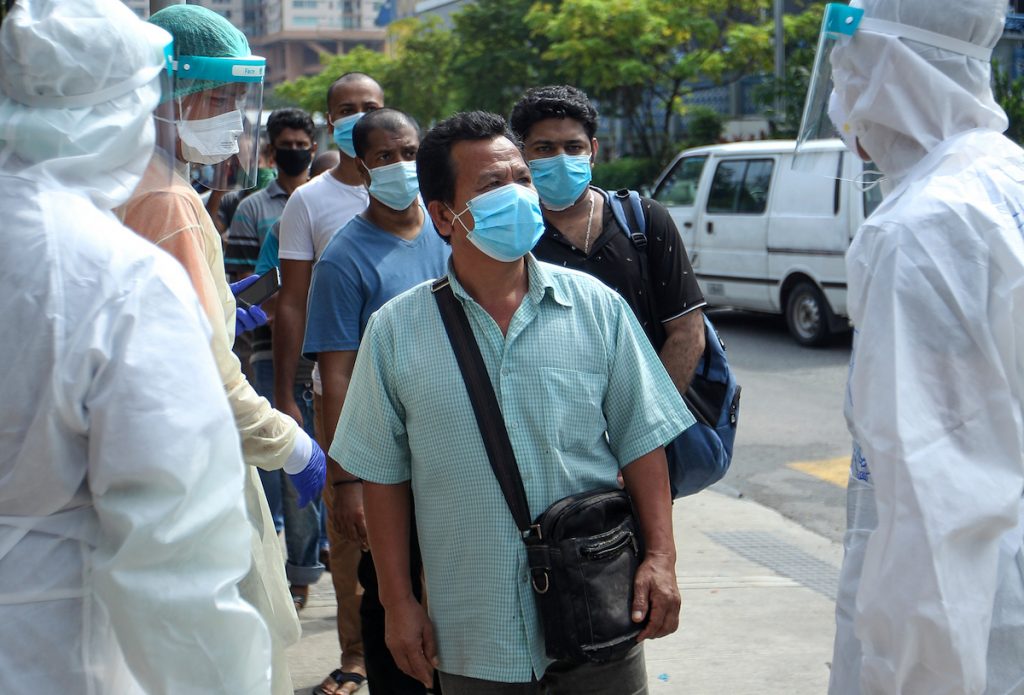Cambodian woman Chan Sokha* entered Malaysia just over three years ago to work under the radar. Since then the 40-year-old hasn’t returned to home country to see her two sons who live with her mother. Now the COVID-19 crisis has compounded the uncertainty of her situation.
“I can only talk with them on Facebook, but often they don’t want to talk with me. It’s because I left them when they were just 3 and 5 years old,” Sokha told LiCAS.news in a Facebook call. Her boys are now 8 and 7 years of age.
During her interview with LiCAS.news, Sokha was sitting behind her sewing machine somewhere in the Malaysian state of Johor. She said she usually works from 8 am till 9 or 10 pm, seven days a week. The more she sews, the more salary she earns.
Cambodian labor rights group Central estimates there are about 40,000 Cambodian migrant workers in Malaysia, like Sokha, most of them working illegally.
Due to the COVID-19 crisis more than 110,000 Cambodian migrant workers returned from countries such as Thailand and South Korea, but many illegal workers from Cambodia working in Malaysia didn’t have the resources to return home while borders were still open.
In early May the Malaysian authorities rounded up hundreds of undocumented workers in the capital Kuala Lumpur. The authorities said the raid was necessary to suppress the spread of the virus among workers and to other parts of the country.
The United Nations warned Malaysia that the fear of arrest and detention could push illegal workers into hiding and prevent them from seeking treatment if they are infected with the virus.

Many illegal workers — like Sokha — already feel that they have no other option but to live in the shadows.
Sokha first came to Malaysia as a migrant worker in 2007. A recruitment agency organized a training course for her and helped her getting a passport, a visa and a work permit. However, the fees were high and once she started working in a Malaysian factory part of her salary was deducted to pay the agency.
Sometime in 2009 she began a relationship with a man — also a migrant worker from Cambodia — in a factory where they both worked.
Together they returned to Cambodia in 2010 and got married the following year but he left her in early 2013. “I never heard anything from him again … I don’t know how to reach him,” she said.
Sokha also had large unpaid bills due to her needing medical help for the birth of her two children.
“My husband wasn’t there to help, so I had to borrow money to cover the bills. That’s why I decided to back to Malaysia [in 2017], to earn enough money to pay off my debts in Cambodia.”
This time Sokha didn’t use an agency. Instead she used a broker who helped her enter Malaysia on a one-month tourist visa. Again, she borrowed money and when she wasn’t able to repay it on time the interest piled up.
“Because I’m illegal, I can’t work in a factory. So, I sew the clothes at home. I only earn between 800 and 1,000 Malaysian ringgit per months, which is between 180 and 250 US dollars,” she said.
Khun Tharo, a program manager at labor organization Central, said illegal workers are at risk, are regularly exploited and lack support.
“When they need to leave Malaysia or when they enter Malaysia, the must pay a broker to assist them. They often enter the country over land,” Tharo said. “According to our information workers spend around US $600 to 700 each time the leave or enter the country.”
The coronavirus now puts many illegal workers under further strain, especially as work dries up. “If they’re documented they would be able to get a social security funding from the Malaysian government to support their daily lives, but undocumented workers get nothing,” Tharo said.
To save money Sokha shares a room with several other Cambodians but she finds it’s hardly enough to get by, let alone to go back to Cambodia when the threat of COVID-19 slackens and borders reopen.
“I still need to pay back a loan to a Chinese money lender. He won’t let me go back to Cambodia before I pay of my debt. He often comes here to ask for his interest,” she said.
Sokha said she doesn’t want to ask the Cambodian embassy for help. She is worried that it will result in an arrest or in a heavy fine, since her tourism visa expired three years ago.
Her initial plan to send money to her family in Cambodia fell apart as well. Deeply indebted, Sokha now finds herself mostly unable to send money to her kids.
Back in Cambodia, Sokha’s 67-year-old mother named Pov Tol is also in a dire situation. Speaking by phone Pov Tol told LiCAS.news that she sold a plot of land to help Sokha pay off her debts, but it still wasn’t enough.
Pov Tol said that part of her daughter’s debt comes from a microfinance institution (MFI) loan used to build a small house.
“She can’t afford to pay the debt, so the MFI people come to me, to yell at me, to insult me and to threaten me. In the end I sold the wooden house she had built,” Pov Tol said.
Sokha said she tried hard to find a job in Cambodia before her second trip to Malaysia but had no luck. “A pure water facility near my village once offered me a job, but at the end they went bankrupt and had to shut down the facility. The only option left for me was to come to Malaysia,” she said.
*Name changed in article to protect identity.






